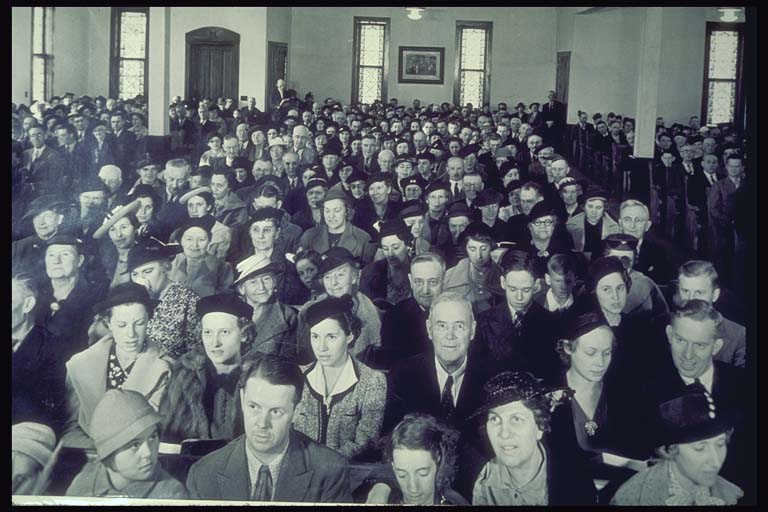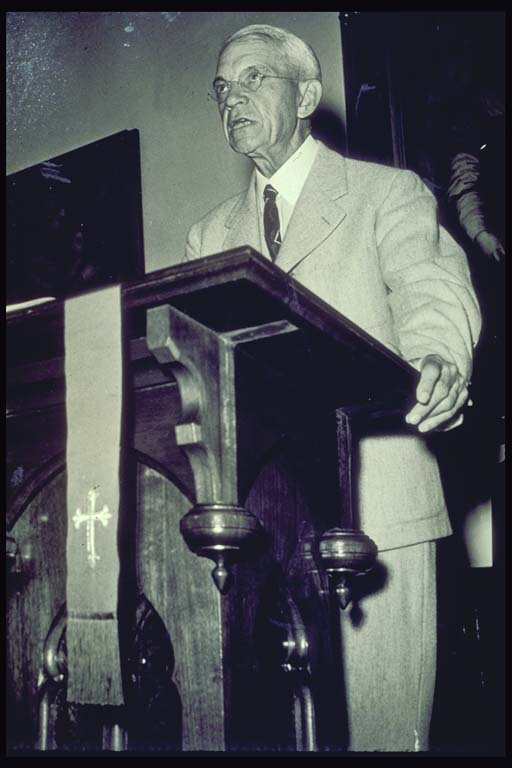 "Compare these
two passages. The first is Isaiah 64:4: 'Men have not heard nor perceived by the ear,
neither hath the eye seen, O God, besides thee, what he hath prepard for him that waiteth
for Him.'
"Compare these
two passages. The first is Isaiah 64:4: 'Men have not heard nor perceived by the ear,
neither hath the eye seen, O God, besides thee, what he hath prepard for him that waiteth
for Him.'
A newspaper account of William Lyon Phelps preaching at Huron City in 1933
'Green Pastures' Is Praised Sunday By Author
 Huron City, Aug. 24
. -"Join the
society of Jesus Christ and become His Follower," Prof. William Lyon Phelps urged in
his sermon "Green Pastures," before the usual capacity congregation Sunday
afternoon in the Huron City Methodist Episcopal church.
Huron City, Aug. 24
. -"Join the
society of Jesus Christ and become His Follower," Prof. William Lyon Phelps urged in
his sermon "Green Pastures," before the usual capacity congregation Sunday
afternoon in the Huron City Methodist Episcopal church.
The text was St. John, 1:17: "For the law was given by Moses but grace and truth came by Jesus Christ."
Mr. Phelps commented at length on the production, "Green Pastures," which he said, he saw twice on the stage and on the screen recently in Bad Axe.
Mr. Phelps praised the production greatly, saying. "At first, I was afraid it might be it is just the other way. It is not only deeply religious but it gives us new ideas of religion and the difference between the Old Testament and the New Testament."
The life of the Negro actor, Richard Harrison, who played "DeLawd" in the stage play was described briefly by Mr. Phelps. The actor visited the Phelpses in New Haven, Conn. on one occasion. Harrison was formerly a waiter in the Hotel Ponchartrain in Detroit, Mr. Phelps related and gained distinction with his fellow waiters by
often reciting whole acts of Shakespeare from memory.
Harrison was recommended to Roland Stebbins, producer of the play and motion picture, when "Green Pastures" was first started.
Picture Excels Play
Mr. Phelps remarked that the motion picture excels the play as there is no limit to the scenic effects, possible in motion pictures.
Scenes from the play, including Noah's Ark, Adam in the Garden of Eden, Cain and the Wickedness in the world, were described by Mr. Phelps.
Mr. Phelps said: "There is humor in the play, which I feel is perfectly proper. If there is no humor in the next world. I will not care very much about going there but I think there will be plenty.
"Green Pastures" represents a Negro child's conception of God as told to him by a Negro Sunday school teacher." "The play ends with the close of the Old Testament era and presents the hope of a glorious future, in which the spirit of God illuminates thewhole world."
"When we hear music by Schubert and Beethoven and when we read the poetry of Shakespeare, we must be as near divinity as a human being can get."
Lord Takes Good Care
Discussing the Twenty-third Psalm, Mr. Phelps read "The Lord is my shepherd". Isn't that a beautiful thought? The word shepherd in Latin is 'pastor.' The Rev. William H. Morfard is shepherd of this church. "The words of the Twenty-third Psalm have been repeated by 600,000 persons in all the languages of the world.
"There is one passage in the Psalm, which I did not understand until about 10 years ago. It is "Thou preparest a table before me in the presence of mine enemies'.
"In medieval times, some persons would imprison their enemies in dungeons beneath their dining rooms so they could eat their meals with greater relish because they knew their enemies were imprisoned. I used to think that passage meant something like that.
"But no, it is something entirely different. The enemy of the sheep is the wolf. "The Lord takes such good care of us if we believe in Him that He not only 'makest us to lie in green pastures' and 'leadth us beside still waters' but he takes us at night and keeps us in security so that we may eat in safety."
He commented on the difference, between the Old Testament and the New Testament. "All through the Old Testament, we are looking forward to a divine consummation. In the New Testament, we are rejoicing because it is here.

"The second is Corinthians 2:1: As it is written, eye hath not seen, nor ear heard, neither have entered into the heart of man, the things which God hath prepared for them that love Him'.
"Isaiah said, 'For him that waits.' Paul the apostle said, 'For them that love Him."
Mr. Phelps pointed out the last word of the Old Testament is "curse" while the New Testament starts "The New Testament of our Lord and Savior Jesus Christ."
"Sin goes on in the world, because that is part of human nature. All we know of all persons, who have ever lived, except Jesus Christ, of all persons who now live and of all persons, who will ever live, is that they are imperfect.
"Note the text of today's sermon. One part is law-'You do this or you will get hurt'-the either is 'Come unto me and I will give you rest."
Mr. Phelps remarked that the greatest writer, who ever lived, was Shakespeare, born in 1564; the greatest musicians were Bach and Beethoven, born in 1685 and 1770; the greatest painter was Raphael, born in 1483, and the greatest personality Jesus Christ, who lived 1,900 years ago.
Mr. Phelps said, "The world is the same today as then but Jesus taught us a way to better life. Jesus said, 'I will change your heart. You will have trouble and sorrow but I will show you how to overcome them.' 'Take My Way of Life'
"A yoke helps oxen to pull a load easier although it does not reduce the weight of the load. "When Jesus said, "Take my yoke upon you,' he did not mean servitude. He meant "Take my way of life: you will find the burdens of life easier.
"Join the society of Jesus Christ. Become his follower. Try it." Mr. Phelps spoke briefly of the Bad Axe fair, which he termed the "Bad Axe World's Fair." "I would not miss it for anything," he said.
Mr. Phelps will speak at 3 p.m. next Sunday on the subject. "The Plumb Line."
The vocal soloist Sunday was Earl Morden, Bad Axe. Miss Adams, Detroit, played violin selections.
Transcribed by Mark Kubacki